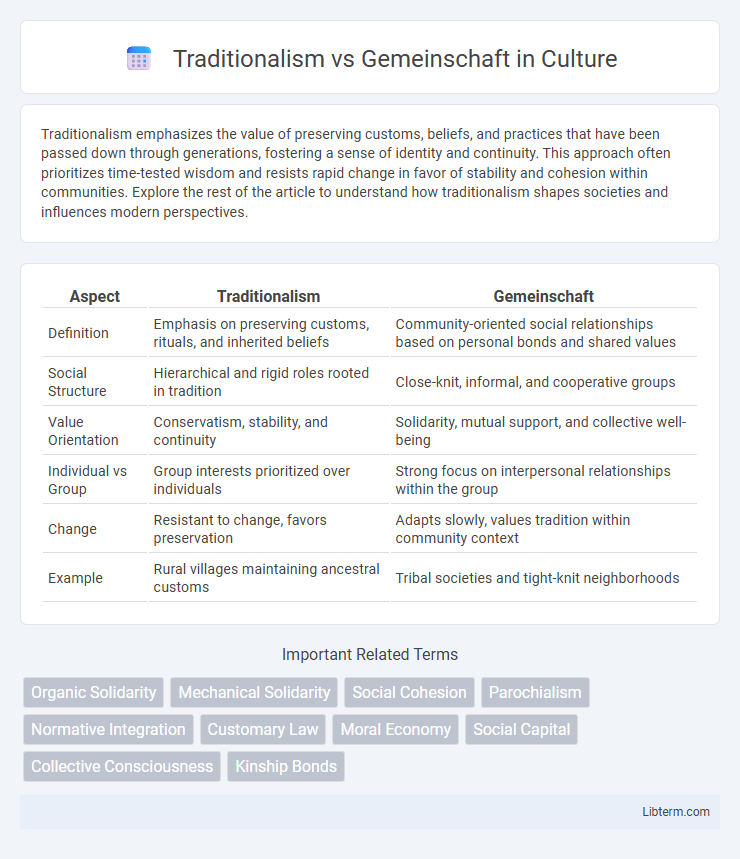Traditionalism emphasizes the value of preserving customs, beliefs, and practices that have been passed down through generations, fostering a sense of identity and continuity. This approach often prioritizes time-tested wisdom and resists rapid change in favor of stability and cohesion within communities. Explore the rest of the article to understand how traditionalism shapes societies and influences modern perspectives.
Table of Comparison
| Aspect | Traditionalism | Gemeinschaft |
|---|---|---|
| Definition | Emphasis on preserving customs, rituals, and inherited beliefs | Community-oriented social relationships based on personal bonds and shared values |
| Social Structure | Hierarchical and rigid roles rooted in tradition | Close-knit, informal, and cooperative groups |
| Value Orientation | Conservatism, stability, and continuity | Solidarity, mutual support, and collective well-being |
| Individual vs Group | Group interests prioritized over individuals | Strong focus on interpersonal relationships within the group |
| Change | Resistant to change, favors preservation | Adapts slowly, values tradition within community context |
| Example | Rural villages maintaining ancestral customs | Tribal societies and tight-knit neighborhoods |
Introduction to Traditionalism and Gemeinschaft
Traditionalism emphasizes the preservation of long-established customs, beliefs, and social structures, often rooted in religious or cultural heritage. Gemeinschaft, a concept introduced by sociologist Ferdinand Tonnies, describes close-knit community relationships characterized by personal ties, shared values, and strong social cohesion. Both concepts highlight the contrast between enduring social bonds and the evolving dynamics of modern society.
Historical Roots and Philosophical Foundations
Traditionalism finds its historical roots in pre-modern societies where customs and rituals upheld social order, emphasizing continuity and collective heritage. Gemeinschaft, a concept developed by sociologist Ferdinand Tonnies, philosophically grounds itself in close-knit, intimate social relationships based on shared values and mutual bonds typical of rural communities. Both frameworks critique modernity's impact on social cohesion, highlighting a return to organic, community-centered life as opposed to impersonal, Gesellschaft structures.
Defining Traditionalism: Core Principles
Traditionalism centers on preserving longstanding cultural norms, rituals, and social structures that emphasize continuity and stability within a community. It advocates for established values and customs passed down through generations, fostering a collective identity rooted in shared history and heritage. This approach prioritizes social cohesion and hierarchical relationships over individualism and rapid change, aligning closely with Gemeinschaft's emphasis on intimate, community-based bonds.
Understanding Gemeinschaft: The Social Concept
Gemeinschaft, a concept introduced by sociologist Ferdinand Tonnies, emphasizes close-knit, personal social relationships typical of traditional societies. It is characterized by strong communal bonds, shared values, and emotional connections that foster social cohesion and collective identity. This social framework contrasts with impersonal and rational associations, highlighting the significance of mutual trust and intimacy in maintaining societal harmony.
Key Differences Between Traditionalism and Gemeinschaft
Traditionalism emphasizes the preservation of established customs, rituals, and social norms rooted in historical continuity and cultural heritage, often resisting rapid change. Gemeinschaft, a sociological concept coined by Ferdinand Tonnies, describes intimate, community-based social ties characterized by personal relationships, shared values, and collective consciousness, typically found in rural or tightly-knit societies. Key differences lie in Traditionalism's focus on maintaining cultural traditions versus Gemeinschaft's emphasis on organic social bonds and mutual interdependence within a community.
Cultural and Societal Impacts
Traditionalism emphasizes long-standing customs and social norms that foster community cohesion and stability, deeply influencing cultural identity and collective values. Gemeinschaft, characterized by intimate, face-to-face relationships and strong social bonds, reinforces communal support and shared responsibilities, shaping societal structures through mutual trust and cooperation. Both frameworks impact cultural continuity and societal integration by promoting interpersonal connections and preserving heritage amidst modernization pressures.
Traditionalism in Modern Societies
Traditionalism in modern societies emphasizes the preservation of cultural heritage, social norms, and customs rooted in historical continuity, often resisting rapid change and modernization. It fosters strong community bonds, shared values, and collective identity similar to the Gemeinschaft model but operates within contemporary frameworks. This approach supports social cohesion by valuing long-standing practices, familial ties, and moral traditions amid modern societal complexities.
Gemeinschaft in Contemporary Communities
Gemeinschaft in contemporary communities emphasizes close-knit social relationships, shared values, and collective well-being, often contrasting with the impersonal nature of modern urban life. This model fosters strong social cohesion through face-to-face interactions, mutual support, and a sense of belonging that transcends individualism. The persistence of Gemeinschaft is evident in rural villages, religious groups, and intentional communities where traditional social bonds remain vital for cultural continuity and social stability.
Challenges and Critiques of Both Concepts
Traditionalism faces challenges including resistance to social change and rigid adherence to outdated norms that may hinder progress and individual freedoms. Gemeinschaft, characterized by close-knit community ties and shared values, is critiqued for potentially limiting personal autonomy and suppressing diversity due to its emphasis on collective identity. Both concepts struggle to balance preservation of cultural heritage with the demands of modern, pluralistic societies.
Conclusion: Relevance in Today’s World
Traditionalism emphasizes long-standing customs and social norms as the foundation of community cohesion, while Gemeinschaft centers on intimate, personal relationships in close-knit groups. Both concepts remain relevant by illuminating how modern societies balance cultural continuity with the need for social bonds amid increasing urbanization and digitalization. Understanding these models helps address challenges in fostering social trust and identity in contemporary contexts.
Traditionalism Infographic

 libterm.com
libterm.com